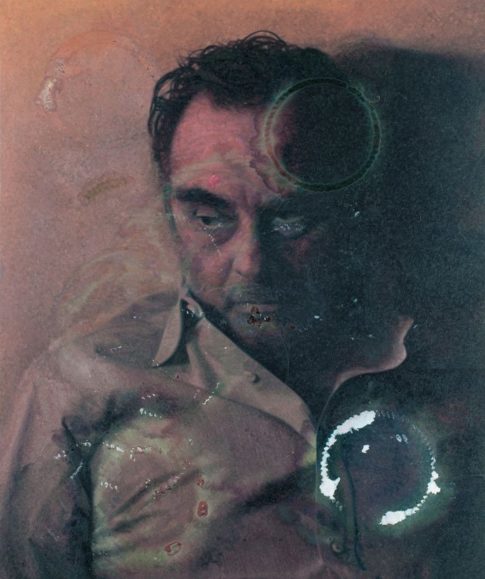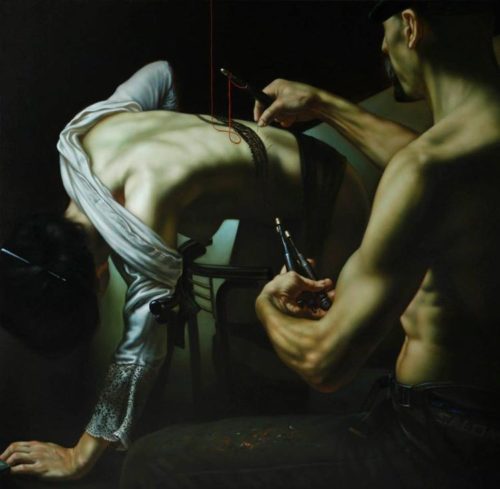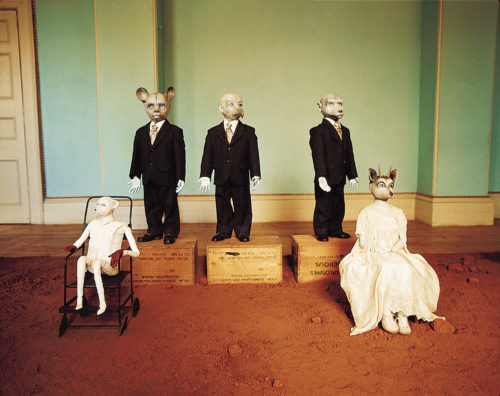
Rudolph Stingel
“…the reduction of leisure time as the marginal utility of money income rose, and the real location of labor from goods and services for direct consumption to marketed goods that is, a new strategy for the maximization of household utility. We see it among peasant households concentrating their labor in marketed food production, in cottar households directing underemployed labor to proto-industrial production, in the more extensive market-oriented labor of women and children, and finally, in the pace or intensity of work.”
Jan DeVries (The Industrial Revolution and the Industrious Revolution,” The Journal of Economic History 54,#2)
“Leveling in the context of necessities and personal life is a reactionary and petit-bourgeois absurdity { } The idealization of agricultural communes was encouraged at a certain time, going as far as to introduce workshops and factories into the communes, where skilled and unskilled workers, working each according to their vocation, had to put their salary in the common fund, and later divide it in equal parts. It’s well known how much damage was caused for our industry by these puerile exercises in leveling due to “left” bunglers.”
Joseph Stalin (Problems of Peace, Complete Works)
“We have already mentioned the military interventions of 1780, 1812 and 1819, as well as coercive legislation in the form of the “Bloody Code” and the CombinationActs of 1799–1800. In the aftermath of the violent suppression of the Swing Riots of 1830–1831, the reform of the Old Poor Law in 1834 tightened restrictions on poor relief by ending most relief out-of-doors and for the able-bodied, making service in the workhouse mandatory. As it was by now well-known among the poor that workhouse conditions were intentionally made intolerable, no person in his or her right mind would voluntarily choose to go. The terror of the workhouse now served to corral market-dependent workers into seeking out and accepting any form of employment, even where conditions were only marginally better
than in the workhouse. Under such conditions, the appearance of workers “choosing” to accept menial work at minimal wages without being forced back to work at the point of a bayonet could be interpreted as a simple exchange of labor for wages in a free marketplace, the coercive powers of the state now receding into the background.”
M.A. Zmolek (Compelled to Sell All: Proletarianization, Agrarian Capitalism and the Industrial Revolution)
“The tendencies in people which make them susceptible to propaganda for terror are themselves the result of terror, physical and spiritual, actual and potential oppression.”
Max Horkheimer (letter to Marcuse, 1943)

Frauke Eigen, photography.
There has been a seamless transition from the Covid pandemic narrative to the Ukraine crisis narrative. It happened in an astonishingly short period of time. And it is interesting, and this is my anecdotal observation, that the anger and near hysteria about the pandemic, has increased in intensity and in more open expressions of opinion, with the Russia/Ukraine storyline. The transition from the pandemic state of emergency to the military ‘crisis’ of Ukraine and Russia has helped to normalize this idea of ’emergency’. A ‘state of emergency’. And it has granted permission to the white West to give voice to the buried or half buried bigotry and orientalism that was simmering below the surface.
Remember that Hitler’s rise to power was catalysed with the Reichstag Fire of 1933. And the state response has been often compared to the state response to 9/11.
“The Reichstag building broke into flames on the night of February 27, 1933. Immediately mass arrests were carried out using carefully prepared lists of Communist leaders and Reichstag deputies, as well as various Social Democrats, leading left-wing intellectuals, and trade union leaders. In the first night some four thousand were seized, brought to SA barracks, beaten, and tortured. Goering announced that the Reichstag Fire was to have been the signal for an insurrection and terrorist acts throughout Germany. On February 28 the Decree for the Protection of People and State Against Communist Acts of Violence Endangering the State was promulgated over the signature of von Hindenburg. The first article removed all fundamental rights specified in the Weimar constitution, specifically listing personal liberty, freedom of expression, association, and assembly, and the need for warrants for house searches. The second article gave the national government the right to remove all the state governments. Another article provided the death penalty for violation of the offenses set out in the decree, and for arson.”
John Mage, Michael Tiger (The Reichstag Fire Trial, 1933-2008: The Production of Law and History,Monthly Review, 2009)
The ‘Patriot Act’ echoes the ‘Decree for the Protection of People etc’. What is of interest here, as the Russophobic propaganda of today seems to have no limit, is the public response. The othering of Russia. The sense I have is of a much deeper and more indelible indoctrination in many today, compared to ninety years ago. And with the rise of social media, in all its forms, the so called ‘virtue signalling’ of the new true believer is reaching levels of madness. And a deeper look at ‘virtue signalling’ is in order.

Renate Graf, photography.
“Public opinion denounces the Bolshevik Revolution as the result of a supposed Judaic-Bolshevik plot, even in nations with established liberal traditions (in England, TI1t: Protocols of the Learned Elders of Zion is supposedly printed by the “official press of His Majesty”). Indeed, this is the opinion of many one might never suspect, leaders and people of great prestige, to include Winston Churchill. Churchill calls for resistance to “the worldwide conspiracy to overturn civilization,” one of the aims of the French Revolution, assisted by the Jews.”
Dominico Losurdo (Heidegger and the Ideology of War)
The patsy for the Reichstag Fire, a young Dutch worker named Marinus van der Lubbe, was executed by guillotine in the courtyard of the Leipzig Prison courtyard, a few days short of his 25th birthday. This also resonates in the shadow of Guantanamo Bay and Abu Ghraib. It strikes me that western culture has descended into a strange death cult, one with a growing irrationality. Regression to myth. One can mention the Hadditha Massacre, or the Maywand District murders, the Mahmudiyah rape and killings, back to My Lai, and back to Wounded Knee. Violence goes back to the dawn of time, or at least the dawn of capitalism (more on that below) but the public need for sacrificial victims has changed. The Girardian scapegoat mechanism has seemed to change, too.
It is interesting to note that Hitler and the National Socialists, blamed communists for the Reichstag Fire. That was sort of the point. And again, here, the Bolshevik Revolution casts an impossibly large shadow across the 20th century. Shadow is the wrong word, of course, but you get the idea. For fascism, the arch enemy is communism. And from the Russian revolution onward the spectre of communism spreading became a western archetype — it literally became the shadow (in Jungian terms). A spreading virus, an ideological plague.

Arcangelo Ianelli
Meanwhile, let me quote Michael Hudson on another branch of the current madness…“But the final breakaway from NATO’s adventurism must come from within the United States itself. As this year’s midterm elections approach, politicians will find a fertile ground in showing U.S. voters that the price inflation led by gasoline and energy is a policy byproduct of the Biden Administration’s blocking of Russian oil and gas exports. (Bad news for owners of big SUV gas guzzlers!) Gas is needed not only for heating and energy production, but to make fertilizer, of which there already is a world shortage. This situation is exacerbated by blocking Russian and Ukrainian grain exports to the United States and Europe, causing food prices already to soar. There already is a striking disconnect between the financial sector’s view of reality and that promoted in the mainstream NATO media. Europe’s stock markets plunged at their opening on Monday, March 7, while Brent oil soared to $130 a barrel. The BBC’s morning “Today” news broadcast featured Conservative MP Alan Duncan, an oil trader, warning that the near doubling of prices in natural gas futures threatened to bankrupt companies committed to supplying gas to Europe at the old rates. But returning to the military “Two Minutes of Hate” news, the BBC kept applauding the brave Ukrainian fighters and NATO politicians urging more military support. In New York, the Dow Jones Industrial Average plunged 650 points, and gold soared to over $2,000 an ounce – reflecting the financial sector’s view of how the U.S. game is likely to play out. Nickel prices rose by even more – 40 percent.”
Michael Hudson (The American Empire self-destructs, The Saker, March 2022)
Remember when Qadaffi wanted to start a pan African currency? And whatever happened to the gold in the former Yugoslavia. Never mind. There are in depth writings on all this stuff. I am trying to understand the nature of the western mind, as it were. Hudson’s observations above are echoed by a number of economists, with differences but mostly suggesting a similar set of problems. Here in Norway gas prices are at an all time high, as are energy prices in general, and food prices have been going up precipitously. There seem to be several engines behind all that is going on, but that I hope can be covered in the Aesthetic Resistance podcasts. The Russophobia that has erupted (it was always there, of course) into stunning open expressions of hate and calls for death and war feels tied into the long century of US anti-communism, as noted above. And such anti communism has linkage to antisemitism. From the first World War onward one can trace the roots of today’s migrated antisemitism in the hatred of the Soviet Union (and Russia). What is remarkable in some ways is how the fall of the USSR did little to end the seething resentment of communism. Much as antisemitism increased in the U.S. after Auschwitz and the defeat of the Reich.

Ángel Zárraga
“Just as we noted it in Sombart, we can also note it in Spengler. As early as the beginning of the First World War, Spengler alludes to the role played by “Jewish nihilists” in inciting pacifism in the years preceding the conflict. It is a role well worth remembering, despite the eventual, generalized patriotic zeal that ensues. Immediately after Germany’s defeat, the “Judaic press” is considered partially responsible for the events that are tearing the nation apart, and Jews are held culpable for the revolutionary movement in the modern world, from the Paris Communes to the Bolshevik fury demonstrated during the overthrow of the Czar. Even more interesting is Spengler’s explanation for the revolution in Russia: “The apocalypse’s primal hatred of ancient culture and something of the turbid exasperation which develops from the time of the Maccabees and, much later, results in the insurrection which led to the destruction of Jerusalem, are certainly the foundations of Bolshevism.”
Dominico Losurdo (Ibid)
Losurdo notes that Spengler’s insistence on this cultural (rather than biological) connection with Judaism, Christianity, and Bolshevism tends to situate him perilously close to Nazism. Junger saw the first world war as a positive event, in the broad view. An end to bourgeois security, as he put it. Cutting across this is, of course, Marx and Capitalism. Junger saw the bourgeois desire and search for tranquility as a sign of decadence. And echoes again of Nietzsche. But the humiliation for Germany, after the end of WW1 is an enormous factor here. And these were views born of a mythology of warriors and destinies. Its a comic book world before their were comic books.
And remember Heidegger called Junger ‘too refined’.
“The philosophy which exalts death as his favorite option and as the noble occasion for escaping from life’s distress, only seems to try and fool man. Man senses only too well that he is condemned to death, but not to suicide.”
Franz Rosenzweig (The Star of Redemption)

Marinus van der Lubbe
I am spending a bit of time on Losurdo’s book because it struck me a hugely relevant to the current marital climate of western society. His critique of Heidegger’s nihilism is exactly right, and it is worth looking at the chapter in which he focuses on Adorno and Horkheimer. For in the current trends in western thought is a kind of new ‘archaism’, a legatee of theosophy, Rudolph Steiner, and the Volk-mythos of National Socialism, itself a pastiche of resentments and a sort of masculine compensatory warrior fantasy. And all then sanitized by Disney. (The image of Bill Gates is one borrowed from the Disney sensibility — in another time Gates pastel crewnecks would have been a black leather trenchcoat). In turn we (as Adorno and Horkheimer did) connect this to the deformation of the Enlightenment, and liberalism, to the French Revolution. And most of all to Marx. What can be seen in this current anti-Russian hysteria are deep seated tendencies that are intwined with Capitalism.
“Platforms have functioned as a new form of distributor and producer that the U.S. dominates. Arguably, we are still living in the imperialist era. { } The hegemonic power of American-based platforms is especially crucial because Google, Facebook, iPhone, and Android have functioned as major digital media intermediaries thanks to their advanced roles in aggregating several services. Of course, platforms are not only gathering information from users, but also commercializing user information as commodity, resulting in massive capital accumulation for the owners of these platforms as well as their countries. Although user activities are mainly voluntary when it comes to platforms, activities are commodified by platform owners. The U.S., which had traditionally controlled non-Western countries with its military power, capital, and, later, cultural products, now seems to dominate the world with platforms, benefitting from these platforms in terms of both capital accumulation and spreading symbolic ideologies and cultures.”
Dal Yong Jin (Digital Platforms, Imperialism, and Political Culture)
This is worth mentioning in the context of Ukraine/Russia. The Ukrainian military has a host of social media accounts. They post violent images of dead Russian soldiers, they state their intention to commit war crimes, etc. These are western run platforms for the most part. Facebook and Google even suspended their hate crime rules if the hate speech is directed at Russia or Putin. There is an unstoppable pathological need for consensus in the Western mind today. When Agamben described the Covid lockdowns as fascistic and authoritarian, saying they were ‘frenetic, irrational and entirely unfounded’, he was attacked in media almost instantly. See the rather odious Adam Kotsko’s piece at Slate titled “What Happened to Giorgio Agamben?”. Of course this is a publication whose audience is mostly white educated liberals. And this particular tacit general agreement about state narratives is a part of their personal currency.

Utagawa Kuniyoshi
The point here is that anyone who objected to the state policy of emergency was to be pilloried. And if you did not participate in these cyber lynchings you were yourself subject to scrutiny. Social media accelerates the mob mentality and intensifies it. But there is something deeper involved in both the social response to Covid, and to the Ukraine crisis. Certainly huge numbers of people objected to the lockdowns. I would argue a majority of the world rejected the global health measures. But these voices are invisible on social media. Therefore the official version of those two and half years was the one scripted by the state (and various global health NGOs). Cultural imperialism is what we live with every day.
“Media theoreticians (H. Schiller, 1969; Guback, 1984; Fuchs, 2010a) have especially developed Lenin’s fourth point of imperialism, primarily focusing on the major role of big companies supported by nation-states that dominate the economy. As Lenin (1917) argued, these big corporations, cartels, syndicates, and trusts first divided the home market among themselves and obtained more or less complete possession of the industry in their own country. “But under capitalism the home market is inevitably bound up with the foreign market. As the export of capital increased, and as the foreign and colonial connections and spheres of influence of the big monopolist associations expanded in all ways, things naturally gravitated towards an international agreement among these associations, and towards the formation of international cartels.”
Dan Yong Jin (Ibid)
But let me track back a bit here to the Enlightenment. And to the subject of antisemitism.

Carolyn Walker
“Horkheimer and Adorno bitterly criticize this theme of sacrifice, “exalted by trendy irrationalists [and] inseparable from the deification of the victim, and the deceitful, priestly rationalization of murder, thanks to the apotheosis of the chosen ones. ” What is most significant is that the rhetoric of sacrifice, this category so dear to Heidegger, is now an expression of the predominance of calculative thought and the leitmotif of its history: “The history of civilization is the history of the introversion of sacrifice. in other words, it is the history of renunciation.”
Dominico Losurdo (Ibid)
Victim’s rights is pure Heidegger. This is a very significant observation.
There is another aspect to touch on before digging further into how and why the contemporary westerner is so amenable to propaganda. And that is the way in which history is rewritten and the manner of how it is analysed and then used in the propaganda narrative. The fact that there is any welfare at all in the US, that there is ANY help for the poor, any actual reform of the carceral state is because the working class, the subaltern classes, fought for it. Organized and demanded it. In Europe, in Scandinavia for example, there remains a significant welfare system. Homelessness is dealt with immediately, where it is even found. Addiction and mental health issues have enormous and well funded agencies of assistance. That said, it is slowly being eroded. Or not even so slowly at this point. And these changes are the result in large part of the revisionism in the writing and manufacturing of an *official history*, or a consensus. And this rewriting of history is perhaps most acute with events in recent history. Take the dismantling of the former Yugoslavia. The illegal arrest (kidnapping) of Milosevic and his corrupt trial at the Hague. No matter how often the actual facts of these events are laid out, how often the corrective to the US propaganda is published and explained, the official story, the original propaganda, remains intact. Further back the history of the invasion of Iraq is being revised, and back more, the story of the Vietnam war. Hollywood has already enshrined and made absolute the myth of Osama bin Laden.

Karel Balcar
I have written before about the rehabilitation of fascism. And there is a good deal more to analyse in this, but one aspect of it has to do with aesthetics. I posted parts of Susan Sontag’s piece on fascist fashion in an earlier post. This month there was a mild controversy of sorts around the new line of Burberry camo clothing. The problem being that they used, apparently, Wehrmacht camo designs. This may be no more than the fact that the designer in charge simply liked the pattern. But this is a bigger issue, really. Camouflage clothing has been a staple of Army/Navy surplus outlets since Vietnam. In the 60s wearing camo was part of a counter culture uniform almost. And with practical reasons, it was cheap, it was durable usually. Today, there are issues around stuff like Rhodesian military camo items (so called Rhodesian brush stroke camo). Is it ironic to wear it? What about tiger stripe camo? Tiger stripe was never actually issued (far as I know) by any military, but was bought by many US soldiers during Vietnam. Its heavily associated with Vietnam. Or MARPAT, issued in the early 2000s by the US Marine Corps. Today, MARPAT has been adopted by fashion, a part of the new so called ‘tacticool’ look. (see Charles McFarlane’s webpage Combat Threads for all things about military style..and I say this without irony. Charles does a good job and is very savy). A writer in the New Republic noted… “We worship the post-9/11 military operator. We are a nation drunk on ‘tacticool’ culture.”
Or read it all… https://newrepublic.com/article/154033/american-beards-military-culture
This is more meaningful than one might first think. And that is because today in the age of screen image saturation the Imperialist west is a screen hegemon. The ever revolving fashion industry has always poached from the underclass. One of McFarlane’s photos struck me regards this…

Dominican constitutionalist rebels, Santo Domingo 1965.
The rehabilitation of fascism has never really stopped. The defeat of the Third Reich simply changed the registers in which domination and racial capitalism operated. And its hardly a surprise that Heidegger has found such popularity in Academia, notwithstanding the publication of the so called Black Note Books. And in fact Heidegger is a sort of ur-antisemite. More on this below.
“The stages that precede Nazism and the indescribable massacre of Auschwitz here refer to the violence perpetrated by the great European powers against the colonized peoples, as well as the violence committed, in the very heart of the West, against the poor and the outcasts locked in “work houses” that seem to anticipate what will later become concentration camps. Reflections like these are completely absent in Heidegger’s work.”
Dominico Losurdo (Ibid)
It is important to understand, I think, that antisemitism is bound up with the very origins of capitalism. It finds expression in a variety of substitutes; Arabs, Persians, Chinese, and black Africans. The slave trade itself is an expression of profound ambivalence regards identity, and self. Heidegger is a good example with this radical anti-modernism, one that found kinship with Nazi mythology. The Orientalism of the West is also, of course, tied into this dynamic. As is the class struggle.

Jane Alexander
“Just as little as people believe in the depth of their hearts that the Jews are the devil, do they completely believe in their leader? They do not really identify themselves with him but act this identification, perform their own enthusiasm, and thus participate in their leader’s performance. … It is probably the suspicion of this fictitiousness of their own ‘group psychology’ which makes fascist crowds so merciless and unapproachable. If they would stop to reason for a second, the whole performance would go to pieces, and they would be left to panic .”
Sigmund Freud (Group Psychology and the Analysis of the Ego)
“Our political psychology can be nothing but the investigation of this “subjective factor of history,” of the character structure of the people of a given epoch, and of the ideological structure of their society. Unlike reactionary psychology and psychologistic economism, it does not set itself against Marxist sociology but fits into it in a specific place.”
Wilhelm Reich (Mass Psychology of Fascism)
Reich is long overdue for a renaissance. For Reich simply said that while economic conditions become ideology, there remains questions about ‘how’ this takes place. And, more importantly perhaps, how this retroactively affects the economic process. Reich quotes Marx…
“Our starting point is not arbitrary assumption or dogma, but reality . . . It is the actual individuals, their actions and their material living conditions, the pre-existing as well as those brought about by their actions.”
(The German Ideology)

Jenő Barcsay
and one more quote here from Reich :“In social psychology, the question is exactly the reverse: What is to be explained is not why the starving individual steals or why the exploited individual strikes, but why the majority of starving individuals do not steal and the majority of exploited individuals do not strike.” (Ibid)
Why do individuals act irrationally? Why vote for a candidate who may openly express the intention to further oppress them? (the reactionary answer is, oh, it’s Stockholm Syndrome). I think this is increasingly a critical question for the contemporary West. Why would anyone trust Joe Biden? Or Bill Gates? The facile answer is propaganda. And that is true, but it is only a part of the answer. Maybe even a not very big part, I don’t know. Or rather, this is the wrong question. The first question would have to do with the meaning of trust. A smart young man I know wrote me on social media and said, apropos of the Ukraine crisis (sic)…’They keep eroding people’s ability at sense-making by constant overload, context free drama and pressure to express symbolic solidarity with the “official victims”.’ Eroding people’s ability at sense-making is a very good description. This is certainly now an enormous problem. Again, though, there is another layer — what would sense or meaning look like today. I often feel I don’t know. The irrational has been disguised as rational. And this is the role of occult thinking, and mysticism. Reich called this ‘the divergence between the economy and the ideology. That fascism in Germany came out of a deep identification with occult mysticism, arcane symbology and ritual was not accidental. It is the very core of the fascist sensibility, and it is tied to, as seeds and soil are tied together, with antisemitism. And again, one has to produce an autopsy of prejudice here, and that is what I hope this post can at least point toward.
The ‘official’ victims this week are Ukrainians. Never mind the majority support a Nazi party in power in Kiev. So the revanchist Nazi has become a victim. A certain circle is completed. (and as Johan Eddebo noted in a recent article “Half of the population in Afghanistan is starving (due to wanton Western imperialism). South Sudan likewise. The Congo alone has more than 20 million people on the brink of famine (coltan needed for our electronic toys, diamonds, war).” (entire piece here https://shadowrunners.substack.com/p/unthinking-western-media-consumers?s=r
Official victims are always white. The exodus of refugees from Ukraine are being welcomed into Poland — the same Poland that turned away only weeks ago, at gunpoint, refugees from Syria, Yemen, Iraq, and Afghanistan. The Polish government called them a threat to Polish culture.
“In brief, the goal of sexual suppression is that of producing an individual who is adjusted to the authoritarian order and who will submit to it in spite of all misery and degradation. At first, the child has to adjust to the structure of the authoritarian miniature state, the family; this makes it capable of later subordination to the general authoritarian system. The formation of the authoritarian structure takes place through the anchoring of sexual inhibition and sexual anxiety.”
Wilhelm Reich (Ibid)

Miyako Ishiuchi, photography
For Ukrainian nationalists (the most extreme from the Svoboda Party, Right Sector and Azov Battalion) Russia is the Orient. Their ethnic cleansing targets Russians, deemed not white. The mythology privileges ideas of Mongol hordes and a contamination of pure Aryan white blood. It is interesting that this Eastern threat from Mongol hordes transformed hundreds of years later to Bolshevism.
“The suppression of natural sexual gratification leads to various kinds of substitute gratifications. Natural aggression, for example, becomes brutal sadism which then is an essential mass-psychological factor in imperialistic wars. To take another example: the mass-psychological effect of militarism is essentially libidinous. The sexual effect of a uniform and of rhythmically perfect parades, of military exhibitionism in general, are obvious to the average servant girl, even though they may not be obvious to learned political scientists. Political reaction, however, makes conscious use of these sexual interests. Not only does it create peacock-like uniforms for the men, it uses attractive women in its recruiting campaigns.”
Wilhelm Reich (Ibid)
This is true but incomplete. Recruiting ads, which today means Hollywood military dramas mostly, are far more homoerotic, but also (and this began in earnest with Rambo, though most post war Westerns were also oddly more about erotic witholding than about love) more reified. The camera will spend more time caressing the weapon than the protagonist does with his romantic interest, male or female. And this fetishizing of the gun is a particularly American phenomenon.

Tatsuo Miyajima
“By 2009, the proliferation and effectiveness of new camouflage patterns were beginning to be questioned by lawmakers, not least of all due to the high price tag. Between 2003 and 2010, the US Army alone spent $4 billion developing new uniforms. In 2009, due to overwhelmingly negative reviews of the UCP camouflage, Congress directed the Army to provide appropriate camouflage for soldiers deploying to Afghanistan in the FY 2009 Supplemental Appropriations Act. { } Struggling to find a unique, modern look, the Marines looked to an unlikely source, Ralph Lauren. Looking for another color to add to their pattern, The Marines settled on a color from the Ralph Lauren Santa Fe paint collection called Coyote — now one of the most prominent colors used for military uniforms and equipment.”
Charles McFarlane (Combat Threads)
The US military now appropriates from fashion houses. The circle is reversed. That haute couture discovered camo clothing designs also meant that everyone and anyone could be a soldier. The US far right fringe certainly wear nearly nothing but camo. And this contributes even more to the sense that the populace experiences ‘war’ (like in Ukraine) as a TV mini series. And the integration of military style codes into daily life, in offices, schools and on the street has meant the movie never ends.
Writing of Horkheimer and Adorno’s Dialectic of Enlightenment, Eric Oberle notes…
“…the book takes aim at what was then (and probably remains) the consensus view of Western progress as the linked advance of individualism, science, economic prosperity, and democracy. Behind this vision of history and behind the core concepts of the Enlightenment, there is an unconsciousness, a blindness—and not infrequently, rage.”
Eric Oberle (Adorno and the Century of Negative Identity)
Oberle says the book is about ‘the return to myth’. A regression that included fascism and the culture industry. And this seems right. And part of the hostility to the book these days (despite countless monographs and dissertations on it) has to do with both its paratactical style, and its denouncing of contemporary western society.

Siron Franco
Horkheimer noted that ‘cultural authority’ was a weak replacement for reason and religion. Today, this has become crytalized in the role of the ‘expert’. The often corporate funded fact checker or TV paid commentator. The libidinous character of fascism is always one of brute strength and domination. This is repeated in kitsch form by Ukrainian nationalists and their torch lit parades. But it is also echoed in Wagnerian epics and in today’s sports stadiums. The Super Bowl is only the Disney version, really, of a Nürnberg Rally.
“Science becomes meaningless when researchers ask only simple questions, producing preschematized data. But because careers and grants, institutional and personal survival are at stake, the forced equation of data collection with scientific objectivity drastically narrowed the scope of every question. In the natural sciences, where the utility of the project is technical in nature, this is less of a problem: if “the bridge collapses, the crop fails, the medicine causes illness,” social utility will intervene to save scientism from itself. However, if the question is of broad human consequence—having to do with combating domination, exploitation, or suffering—there is a powerful systemic bias toward “useful” and “measurable” research uncomplicated by concepts or analyses. Data-driven research is indeed driven by the economic, psychological, and social needs of the research system. This systematicity fosters aversion to any subject/object model that does not serve the data-capital nexus, anything that requires thought to be produced or consumed.”
Eric Oberle (Ibid)

Katja Seib
The above quote was in the context of Horkeimer and Adorno’s frequent conflicts with institutional research during the wartime years in the U.S. A bit later Oberle posits a rather significant question “What happens if the spirit of science, aimed at perfecting the means of transforming nature, undermines all sense of human ends to the point where the chain of extended ends snaps and the thinking subject can no longer uphold the Enlightenment ideal of attaching the most useful means to humane ends? “
For this is where the contemporary West (and probably China) are today. It is where modernity has led. A society that can no longer formulate the ends for which its technological obsession is created. The fact that bio labs were still being operated by the Pentagon in Ukraine suggests a deep irrationality at the core of western thinking. Technological expertise given expression as absolute Nihilism.
“Prejudice is a pattern of hostility in interpersonal relations which is directed against an entire group, or against its individual members; it fulfills a specific irrational function for its bearer. This implies that its motivation arises from causes other than the actual qualities of the group against whom the prejudice is directed.”
Nathan Ackerman & Marie Jahoda (Antisemitism and Emotional Disorder)
The recent speech by Ukrainian president Zelensky before congress, on a video screen, was a stage managed constellation of codes, and all of it kitsch. Zelensky in fatigue green military t-shirt, with allusions to Mt. Rushmore no less, and with a fawning tone of supplication. Hand on heart in modest humility. This is the US political spectacle stage managing its latest star, but it is also an example of the everyone-is-a-soldier motif, and my guess is that domestic police (already sporting SWAT drag whenever possible) and American politicians will soon be in camo and military green or battleship grey, as often as possible. The ‘casual Friday’ photo op will be in Flektarn or Belgian brush stroke.
“Moralism becomes a market-tested, cookie-cutter genre, populated by pseudo-choices in the form of differently packaged clichés aimed at particular communities. “Public interest stories” are just the gloss of morality in commercialized news. And even science makes the headlines only if it can reinforce people’s prejudices, moral or amoral. Moralism becomes a market-tested, cookie-cutter genre, populated by pseudo-choices in the form of differently packaged clichés aimed at particular communities. “Public interest stories” are just the gloss of morality in commercialized news. And even science makes the headlines only if it can reinforce people’s prejudices, moral or amoral. { }… the forces of the personality are harnessed for more production, against the interests of actual persons, to play to and reinforce their prejudices and to make them essentially identical if superficially different. { } A new type of subjectivity is created that cannot fundamentally relate to universal subjectivity except through the negation of group identifications. Because reason has become, essentially, a cultural procedure, identity becomes subjective, an owner’s pride in one’s group memberships and settled prejudices”
Eric Oberle (Ibid)

Interior Reichstag , plenary hall, after fire. Feb. 1933
Bourgeois amoralism, as Oberle put it, is legitimised today by imprimatur of social media branding, the personal brand built for years by ‘individual’ users. In Ackerman and Johoda’s study on antisemitism, they noted that the most extreme antisemites rarely suffered clinical depression. The cyber lynch mob then serves as a kind of self medicating device. So normalized are the distractions of the 24 hour news stream that a kind of amnesic compulsive reaction is formed. And this, because there is no time for reflection, is borrowed from the marketed consensus; take your pick, Ukrainian victims, climate change expressed with Greta memes. Etc. This is what Greta is there for, just as this is what Zelensky was chosen for, his telegenic qualities. Interestingly he is also Jewish, a neutralizing factor for his complicity with neo Nazis. But this is the manufacturing of identification, and in these cases (something Adorno wrote about eighty years ago) it is a screen identification, an advert essentially. And adverts must by necessity, really, be stereotypes and stereotyping is the building block for prejudice.
“The structure of the public sphere had changed. And this amplified the problem of the broken systematicity of science and the disciplines. The double transformation highlighted a daunting historical fact: revolution had come not from below, or the Left, but from the nationalist, ontological Right. The elements of systematicity that should have paved the route toward the universalization of the worker had empowered reaction. This pointed toward the need to engage psychological and cultural explanations—matters of personal and group identity—rather than retreat behind the old universalisms.”
Eric Oberle (Ibid)
“As a young Nationalist, Hitler, who lived in Austria, decided to take up the fight against the Hapsburgs who, as he said, “delivered the German fatherland to Slavization.” In his controversy with the Hapsburgs, the reproach that there were a few syphilitics among them assumes an important place. This would not seem important were it not for the fact that the idea of the “poisoning of the people” and the problem of syphilis came up again and again and formed, after the seizure of power, a central part of internal politics.”
Wilhelm Reich (Ibid)
With the Zelensky performance we see democratic themes used to valorize Imperialist and fascist policy. This is really what Hitler and Mussolini both did, and what all fascist orators do. Only the Biden performance, as an American anti-orator, is *the grown up in the room* trope. This borrowed from after school specials targeting 8 or 9 year olds. For this is political infanitlism. Both Zelensky and Biden are voices of irrationalism, *in service to the people*.

Teodora Axente
“Thus, it may be said that the [measurement of authoritarian aggression] represents the sadistic component of authoritarianism just as [the measurement of authoritarian submission] represents its masochistic component. It is to be expected, therefore, that the conventionalist who cannot bring himself to utter any real criticism of accepted authority will have a desire to condemn, reject, and punish those who violate these values. As the emotional life which this person regards as proper and a part of himself is likely to be very limited, so the impulses, especially sexual and aggressive ones, which remain unconscious and ego-alien are likely to be strong and turbulent. Since in this circumstance a wide variety of stimuli can tempt the individual and so arouse his anxiety (fear of punishment), the list of traits, behavior patterns, individuals, and groups that he must condemn grows very long indeed. It has been suggested before that this mechanism might lie behind the ethnocentric rejection of such groups as zootsuiters, foreigners, other nations; it is here hypothesized that this feature of ethnocentrism is but a part of a more general tendency to punish violators of conventional values:homosexuals, sex offenders, people with bad manners, etc.”
Theodor Adorno, et al (The Authoritarian Personality)
The bourgeois subject who must constantly find expressions of consensus, is going to (and this is a trend today that has accelerated ) find anything, even if its only in the style and not even the content, of some heterogeneous expression or object, an offense. An such offense is usually dangerous (see *misinformation*). There is now a practised sensitivity of feeling to personal insult. It is a public ritual part confession and part accusation and part, the most important part, an act of social concern. The obverse of condemnation is the virtue signalling that has taken over various social media platforms. The content can be very mild, but the style can be disruptive. And western bourgeois society has reached a tipping point, I think, were style is likely MORE offensive than content (witness the tweets of late about nuclear war being worth it if it saves European togetherness, etc). Better mass death than to violate the codes of approved discourse. The insidious aspect is that the system itself manufactures official items of disapproval the better to keep the stream of compulsive clicks and keystrokes running.

Kansuke Yamamoto, photography.
“Erikson’s vision of fascists as a “band of brothers” who had cast off the superego as father figure spoke not just to the changing structure of the personality (and thus the desire to eradicate legitimate authority) but also to psychoanalysis’s need to investigate how falsified notions of a leveling impulse could feed radicalized hierarchies or allow for the reversal of allegiances. The idea that a radicalized “band of brothers”—the modern primal horde—could transform a normal bourgeois person into a pogrom participant not through mass psychological appeal but by transformation of the object—a transformation of the terms of legitimacy—became a reason to engage with the substance of cultural perceptions.No vision of scientific objectivity alone could restore social perspective: one had to delve deeper into the divided self’s claims to be an identity, to analyze its impulse toward self-destruction.”
Eric Oberle (Ibid)
A final thought here on antisemitism. And this will be explored more in part two of this. But what Beller has called racial capital, that the technologies of capitalism, the innovations, are built on the othering mechanism, on the slave trade in particular. And on acute inequality; work houses, debters prisons, etc. And all this is class struggle. It is also the antisemitism that finds justification for all predjudice, for inequality. And at this point the scapegoat mechanism enters the story. The rise of the Third Reich was not some mass formation psychosis, but rather the zealotry of the few and a set of mechanisms that made fascism seem reasonable. Today, that is being replicated but at far quicker pace via social media and mass media. Famine and war are ever more reasonable.

Francis Bacon
“What matters today is not so much that people might hate the Jews sufficiently to start a pogrom, but that they might endorse a movement which includes anti-semitism in its platform. “
Theodor Adorno (Ibid)
The people today who encouraged mass lockdowns, costing millions of jobs and subjecting millions of people to severe psychological harm, economic hardship, and hopelessness, are endorsing policies that threaten a nuclear war. The justification is always societal protection. A protection from both a spreading virus, and a spreading ideology.
To donate to this blog, and to Aesthetic Resistance https://soundcloud.com/aestheticresistance/podcast-61
Use the paypal button at the top of the page.

The question I ask is why the people around me – who have always lived affluent and pleasant lives – instantly jumped on the Russophobia bandwagon when it rolled in. When I told my wife I had a shocking secret (I have started to watch the sit-com “Friends” and actually enjoy it!) she instantly came back with “You’re a supporter of Russia?”. I didn’t rise to it since I am aware that her grasp of politics is frankly non-existent and it wasn’t worth getting bogged down in an argument that would only – and pointlessly – create ill feeling. (I had a blow out with a friend over covid which was actually frightening in its intensity.)
But clearly this Russophobia was something simmering under the surface and just ready to ignite. Or, to be more precise, the readiness to hate or at least gratefully go through the motions of hate was simmering away there.
And on a related topic, when going thought all the covid nonsense for the last two years I was astonished how often utterly irrelevant remarks about “evil communism” turned up. Russia is no longer even nominally communist and yet that particular demon still lurks in the background stoking the flames.
As a possibly irrelevant aside, the aforementioned “Friends” started up in 1994 and I always loathed it – those unfeasibly photogenic young mainstream brats frolicking around a pool. I never watched it and whenever I caught a bit, thought it was the most awful bourgeois bollocks.
But lately with Netflix and being curious I tuned into the series from the start and ended up getting hooked on it – purely as a piece of lightweight fluff. It strikes me as being a very young programme – really for starry eyed teenagers. But then I can’t help noticing that, being set in New York, a large portion of external shots feature the twin towers. Thus the entire production looked like a kind of relic of a “more innocent” age. And it strikes me as being particularly fitting that the very programme I thought contemptible pre-9/11 now seems cherishable.
And yes, I am aware that I am spouting self-deception here but I think it worth mentioning as an indication of the increasing decay of the old liberal illusion.
yeah, i had some unpleasant discussions with friends and family about russia/ukraine. The power of conensus. I had them with covid as well, but the russia topic elicits far more intense emotions. Not entirely sure why, to be honest. Other than some of what I wrote about here.
In years ago, when I seeked comfort
& shelter in movie theatres & after
too much popcorn and orange slices, I
frequently stormed out of the Holl ywood
sacrament with a deep sense of nausea.
As movie screens are as much proxies for
theatres as theatres serve as proxies
for life(s) including religion, politics, &
erotic sand love engagements, our blocked character
structures (Reich) and dreams, this nauseating
exits must have represented a soul’s great escape
to freedom.
Speaking of anti-Semitism, I often wonder how different the world would be if medieval society had truly enforced it’s ban on usury, without excepting the Jews. The “moneylender” would never have become a trope. And money would not have become the all-purpose solvent and lubricant of the world. Of course, other, more benign, ways would have been needed to break out of feudalism.
I found the following observation in the
referenced essay hit like a bolt of statement
that is at once historically true and potentially
false, if we turn our guns into plows, as Nietszche
hoped. But, like Macbeth, who will wipe this
blood from our hands?
” War, as Alfred Kazin warned, is “the ultimate purpose of technological society.” ”
https://www.counterpunch.org/2022/03/22/the-lie-of-american-innocence/
Golden sunrise or coal hole?
https://www.counterpunch.org/2022/03/25/the-blowback-from-sanctions-on-russia/
I do hate Hedges, though. And this is an interesting read. Like all Hedges, its mostly right. Except; his list of US war criminals. Why no Bill Clinton or Hillary Clinton, or any of those who terror bombed Belgrade for 70 some days? Why no Obama or his henchmen? Hedges never alludes to marxists or ocommunists, but only to safe voices. Wore, his critique of russia/Ukraine is basically ni ni –both are wrong, but he mentions the plight of the Ukrainians. Does he mention the Nazis in power in the Kiev regime???? NO, he does not. He actually spends more time critizing and condemning Putin that he does Biden or NATO. Hedges is also a bit of a plagiarist as well. Remember he started out writing for the NY Times.
stop reading counterpunch —- honestly, almost anything else. I stopped writing for them for a reason.
The Catholic tradition, in which I was raised, also
prohibited certain texts. I consisted ignored their
cannons & prohibitions. I do not agree with every
viewpoint expressed in any particular venue; for instance,
I completely disagree with Eric Dreiser or Paul Street’s
take on Russia and Putin. And I can’t stand their
editor, JeffreySinclair, with whom I had a verh unpleasant
exchange about 2 years ago. I notice that Mike Whitney
doesn’t write there anymore. And I detest CP’s hysteria
re. Coronavirus & uncritical obeiseance to “Science”, as I
am sure, you do as well. I like individual authors like
Michael Hudson & I read them where I can.
whitney quit around the same time I quit. Draister is a fascist. Street is an uber fascist. St Clarir is just sort of lost. But he’s become rather unpleasant of late.
Yes, I am in sync with you on cp. I never
cared for Alexander Cockburn’s put-downs
of Fidel Castro & his dictates that the
leader of the Cuban Revolution had
altxhrimer & should stop making
pronouncements. I read very few writers ion cp.,
ike Ron Jacobs & articles on Bach & other
music.
With respect to Jeffrey St. Claire, I’ve had
nothing but contempt for that character since
Easter 2019 when he intimated that he
was interested in an essay that I had submitted, only
to unceremoniously reject it based on the
excuse that my cv. was flawed as presented & did
not meet the required format.
If I find any future articles of interest, I will
seek to reference/link them to other publications. I
apologize for my somewhat reckless indiscretion &
pledge not to repeat the practice.